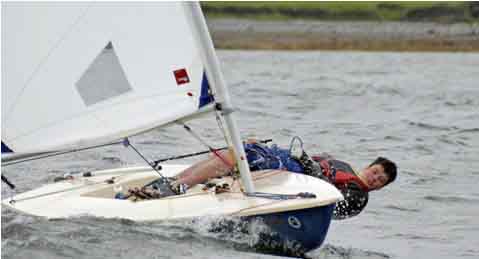Displaying items by tag: County Mayo
Mayo Sailing Club

Established in 1976 to promote sailing in Clew Bay and the West of Ireland, Mayo Sailing Club (MSC) has earned a solid reputation in both cruising and racing. There are currently more than 250 members taking part in various on- the-water activities during the season. Activities include a youth sail training programme, dinghy racing, cruising boat racing, and cruising. On the competitive racing front, members have taken part and performed at the top of class in open events along the west coast and beyond, including the Round Ireland Race and the World Student Yachting Championships. On the cruising front, many members actively cruise the challenging waters of the West coast, while more adventurous souls venture to Europe, across the Atlantic, around the world, and even to the remote regions of the Arctic and Antarctic. Training on these local waters of the wild Atlantic prepares intrepid MSC sailors to sail anywhere.
With a beautiful clubhouse that has stunning views on the shores of Westport Bay, MSC offers sheltered moorings, a pontoon laid on with water and electricity, a slipway and hardstand, boat shed for storing outboards and other equipment, a secure area for stowing dinghies, bar and social room open on race days, comfortable changing rooms with toilets and showers, as well as three rescue boats and one race committee boat. Located just 10 minutes from Westport town.
Since its establishment Mayo Sailing Club has earned a good reputation in both cruising and racing.
There are currently 250+ members, with 33 cruiser/racers, five adult dinghies and 25 junior dinghies all taking part in activities during the season.
From regular summer cruising along the west coast and its islands, to wilderness expeditions to the Antarctic and Artic, members have demonstrated their enthusiasm for sailing. On the racing front members have been to the fore in open events along the west coast arising from the very competitive club racing which has evolved at home at MSC
Activities
MSC moved to Rosmoney in 1983, and from 2008 can offer its members during the season (April to September, except for adult dinghies which starts in January):
– A beautiful new Clubhouse
– Junior sail training and racing each summer
– Class 1, Class 2 and Class 3 cruiser racing Thursday evenings and Sunday afternoons (Five Race Series)
– White Sail Fun Races
– Pursuit Races
– Introduction to sailing courses Tuesdays in May
–Flotilla cruise to Boffin August Bank Holiday, and various cruises and rallies during season,
– Annual club regatta August with Commodores Mid-Summer Ball [Black Tie]

Club facilities at Rosmoney
– Comfortable changing rooms, toilets and showers
– Bar and social room
– Boat shed for storing outboards, etc. (strictly controlled)
– Club slipway and hard stand berthage
– Access to moorings
– Three rescue boats and one race committee boat
– A fleet of junior sailing dinghies for use on the very popular junior sailing courses include four Mirror sailing dinghies and two Optimist sailing dinghies
Contacts
Damien Cashin, Commodore – 087 245 0123 – [email protected]
Paul Murphy, Vice Commodore – 086 839 0581 – [email protected]
Donagh Waldron, Hon. Secretary – 087 2474811 – [email protected]
Mary Walsh, Hon. Treasurer – 086 837 1669 – [email protected]
Cathal Geoghan, Hon. Sailing Sec – 087 797 5627 – [email protected]
Peter Quigley, Junior Organiser – 087 638 9010 – [email protected]
Gerry Daly, Rear Commodore – 085 174 1942 – [email protected]
Paddy Alyward – 087 236 4833
David Baird – 087 236 2124
Boyd Gale – 086 226 3319
Hugh O'Donnell – 086 069 6159
Una Quigley – 087 245 2921
Declan Ruddy – 087 272 6616
James Fitzsimons – 087 230 4331
John O’Brien – 087 241 5664
(The above details and images courtesy of Mayo Sailing Club)
Mayo Sailing Club, Rosmoney, Co. Mayo
Have we got your club details? Click here to get involved




























































